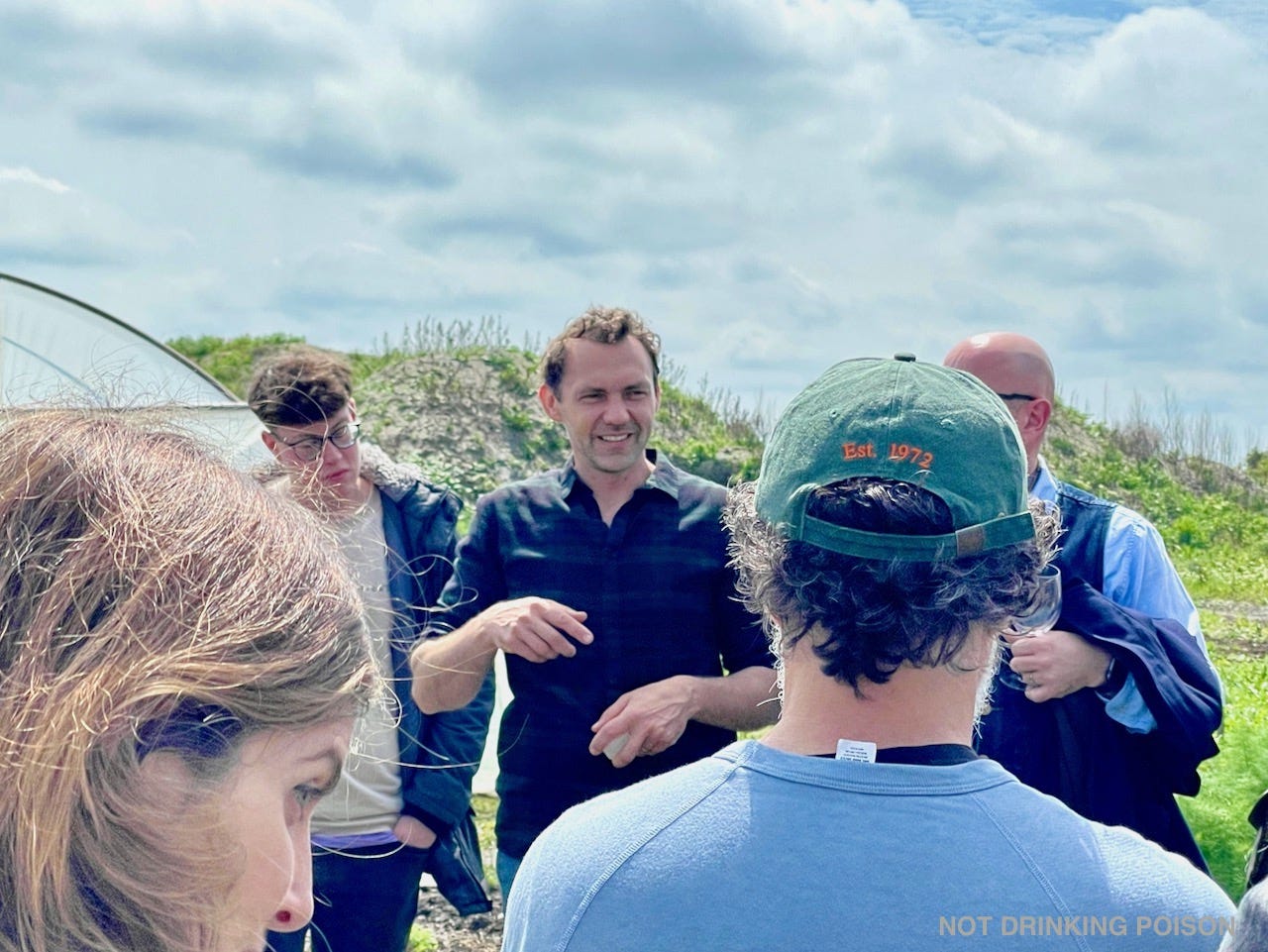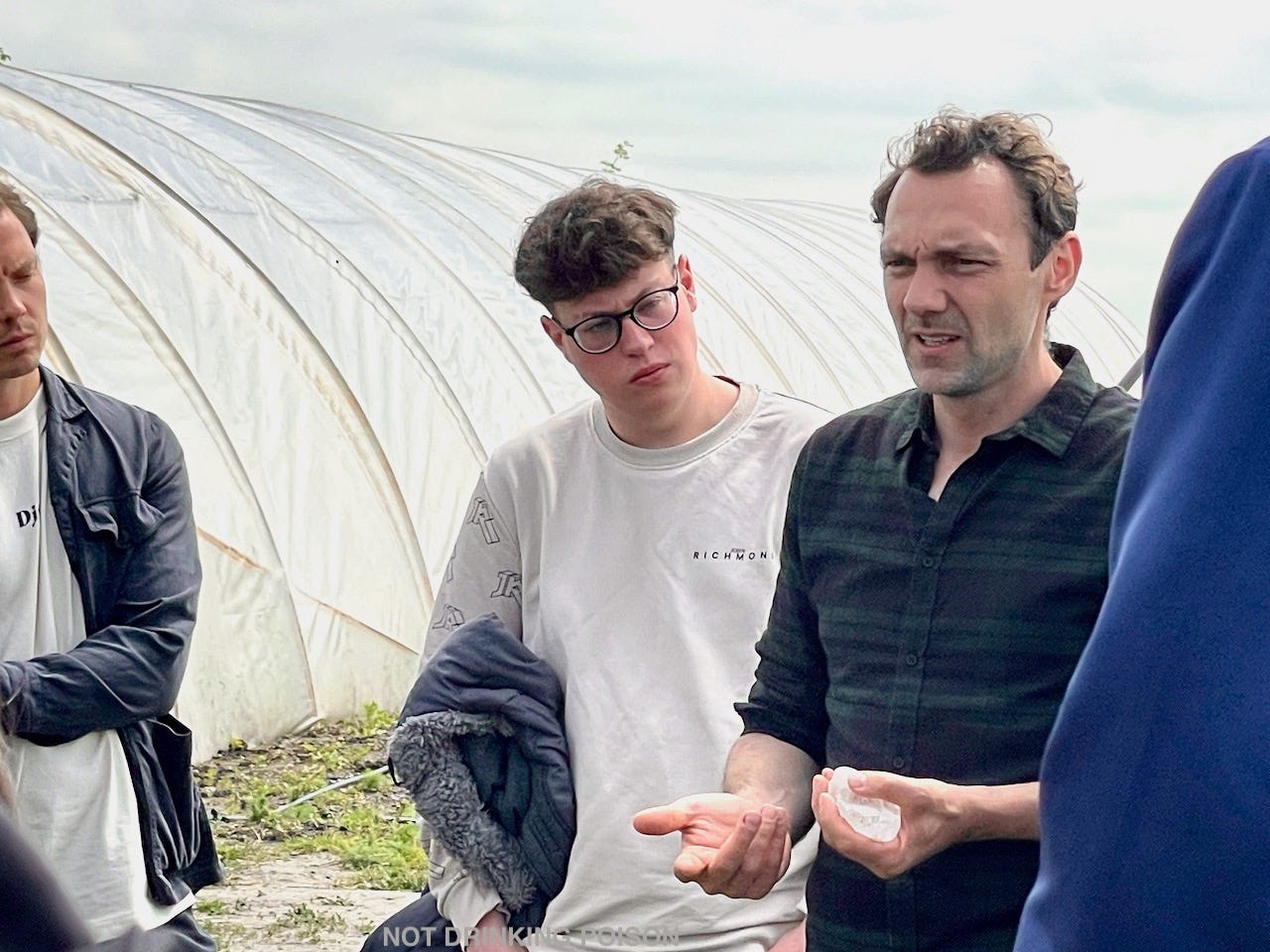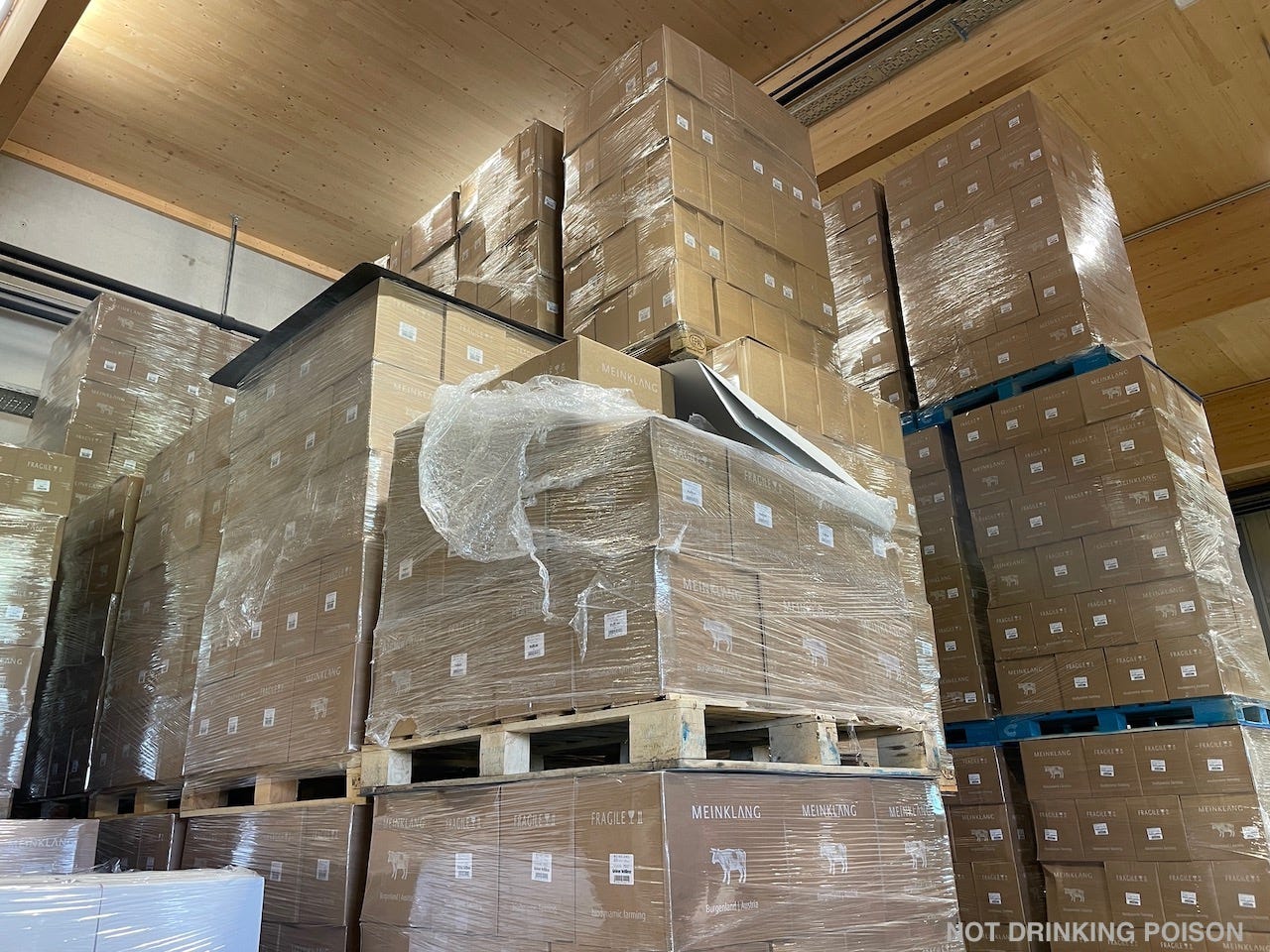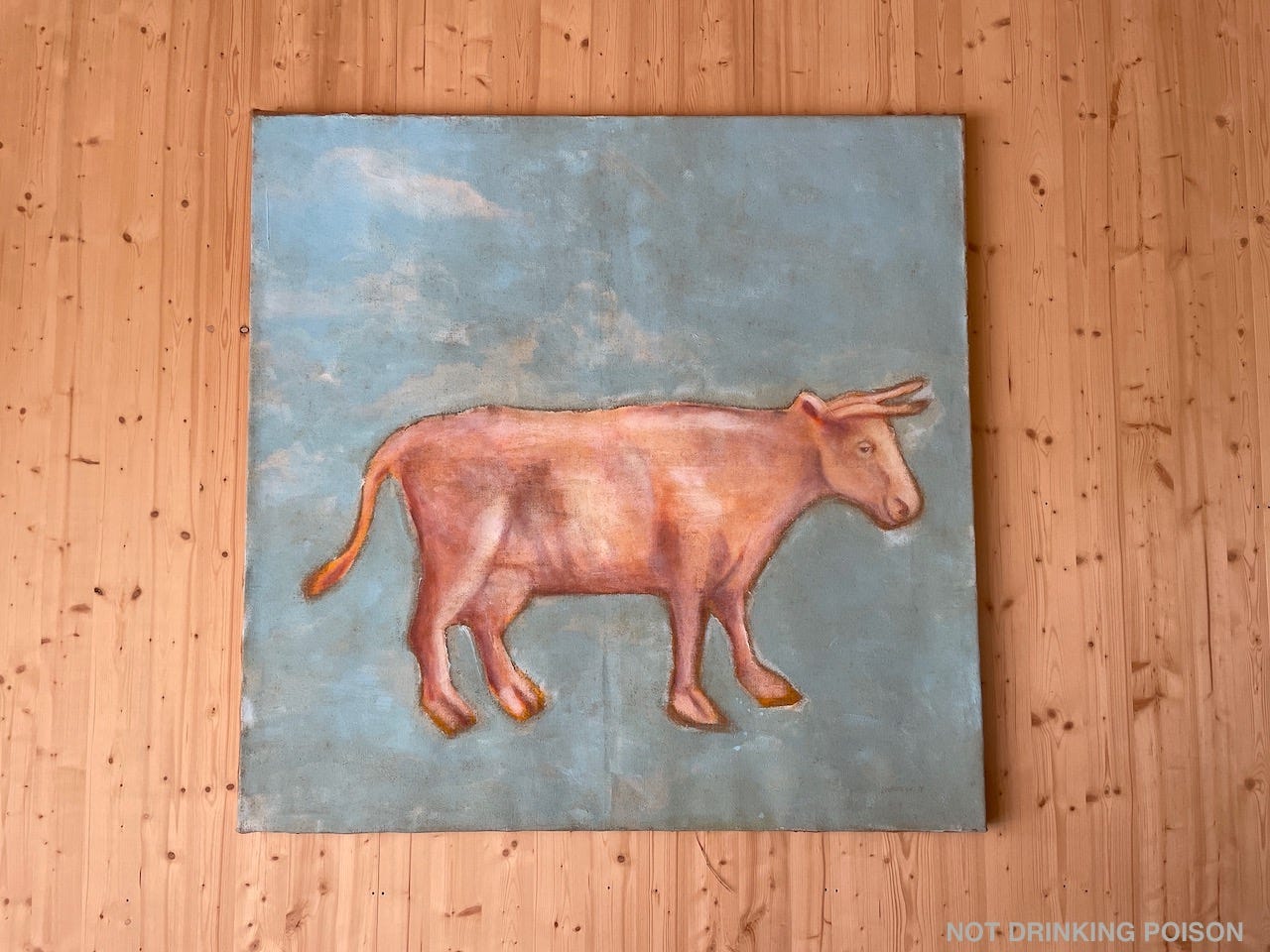For Meinklang, A Harvesting Machine Is Just A Tool
A chat with Meinklang's Werner Michlits on the famed biodynamic Burgenland estate's decision to conduct machine harvesting.
Werner Michlits is the executive face of Meinklang, the 2500ha biodynamic mixed-agricultural estate on the Austrian-Hungarian border that he runs with his wife Angela (who handles winemaking from the estate’s 80ha of vineyards) and his brothers Hannes and Lucas. (Also prominent in the Meinklang enterprise is the family’s managing director, Niklas Peltzer.)
The Michlits’ parents began practicing organic agriculture on what was then just 60ha of farmland in the late 1980s, and embraced biodynamics in 2001, achieving certification in 2003. This followed a period of rapid expansion at the estate, as the end of Communism in nearby Hungary in 1989 gave rise to a period of privatization in which vast stretches of forest and farmland became available for purchase. Today Meinklang’s farm operation extends on both sides of the Austrian-Hungarian border, although their winemaking is concentrated almost entirely on the Austrian side.
Celebrated as much for its ambitiously-scaled biodynamic agriculture as for the Michlits’ influential embrace of natural wine styles and aesthetics, Meinklang has seen a rise to near-ubiquity in many young natural wine markets over the last decade, thanks to the wines’ killer combination of juicy lightness, low sulfite addition, and gentle pricing. In the context of a breakfast event held in May at the Meinklang estate, I spoke to Werner Michlits about his family’s controversial decision to begin machine harvesting, a practice that remains reviled within the natural wine world at large.
WERNER MICHLITS OF MEINKLANG: AN INTERVIEW
The following interview was conducted at the Meinklang estate on May 19th, 2023. It has been condensed and edited for clarity.
Today Meinklang is known for its impressive scale of biodynamic agriculture. How big was the farm when it started?
WERNER MICHLITS: In terms of total farmlands, well, it’s hard to say. In the beginning, the was 8ha of vines. My parents’ generation had 30ha of farmlands of their own property, and another 30ha was leased. My parents’ dream was to have a 100ha farm. But then [in 1989] when the border with Hungary opened, it became so easy. It was during privatization in Hungary. We bought land, because a small part of it was our land in the old days.
And what is the present size of the Meinklang estate?
We are now 2500ha. Vineyards are 80ha.
How many employees does the estate have?
I actually don’t know. Maybe thirty?
How do you divide responsibilities among the family?
It’s sometimes not organized. It’s quite, um how do you say, by feeling, or automatically, who is taking up [a given responsibility]. It’s weird, in a way. Not many people can deal with that. Even if new people come, they’re like, “What is my role here?”
Is it easy to find labor here in Burgenland?
It’s difficult. I mean you get a lot of assistants, [who are] very easy, or empty people.1 And that is actually a big thing. For agriculture. Realizing that for the harvest also. We opened up a big discussion, starting with the harvest machine.
It is a big discussion. For me the question is: does it address the problem of labor shortages, or does it institutionalize that problem?
Here, all the labor we have is imported from the east. Gypsies, people from Ukraine, from Bulgaria, from all over. And I feel so sad about that. It’s just so, in a superficial way, I can say something is “hand picked” or “worked by hand.” But we have to get free of this idea. It’s such a drama for our company, but no one cares about it for fruit production. The whole vegetable sector is full of… It’s a bad situation, really, and nobody is looking at it, or starting to address it.
So we said, “No, this isn’t harvest, we don’t want to work with these conditions.” But all the others, saying “Rage against the machines,” and all that - it’s so superficial, saying that.
In former times, the whole village was involved in the harvest. We didn’t have any foreign people. Now, no one in the village is at the harvest. And you can build up artificial systems. We never will solve the whole society’s problem. But if we all play [along] with it, what will change?
The way our full-time team is set up, they don’t want to work with these people. So they are not in a good mood. I’m in a stress. You have to permanently watch what they’re picking and cutting. It’s a drama. The machine does a better selection than they do by hand. But it’s like this in every estate, it’s everywhere. Some are still lucky to be so small that they can organize [harvest] with friends and relatives. But this is an exception.
I appreciate that it’s a huge problem. In France, too, it’s very hard for people to find harvesters.
We split up [into teams at harvest]. Niklas has a team, Angela has a team, my mother has a team, I have a team. Our full-time people have a team. And everyone is stressed, walking around the pickers all day long. Saying, “Why have you picked that? Look here, this is not so…”
And then you have one person who is so fully enlightened and happy about driving this harvesting machine, knowing all the settings, how to put the vibration on and make the bad berries get selected out. Why not choose this machine, you know? It makes you conscious - it gives you another consciousness of freedom.
We get the wines in with the right pH. We drive the machine in the night. We don’t need cooling energy. To harvest by hand just to be able to say we do work by hand, it’s such marketing.
Of course merely working by hand is not sufficient in itself. But, having witnessed the results of harvesting machines quite closely, they really give different results. The vines are massacred afterwards, not to mention the harvest.
Sure, there are some that are like threshers. But the new ones are totally different.
It’s a dicey issue. It comes down to a question of whether organic and biodynamic farming can, by demonstrating the value of manual labor, help to revitalize rural communities in the long term.
We started housing some of these homeless people. We started bringing their kids to school. But with the old ladies from this gypsy group, there were fights about the kids having to go to school in the morning, about them not being always with their family. We had to pay their own teacher for them. It was so many things. It’s a generational project. You cannot just start from nothing.
I can understand that if you start having to house people and ensure schooling for their children while they’re working in the vines, that indeed becomes a whole other project.
I always like to see [people involved in] this superficial biodynamic thinking see that it’s holistic, and [for them to see] what is involved in it. If I have the consciousness, I am plugging the machine in, you know? All these problems I’ve told you about, the machine for me is just a tool [for them]. And I am over it.
There’s always a view that the technique is the most important thing. We have totally technical equipment, but there is nothing automated here.
Another argument against harvesting machines is that it limits the choices in vinification afterwards, since you’re never going to get fully intact fruit.
If you do a carbonic fermentation, you have to go manual. That’s what we do, as well. But then we have a small fixed team of people, they are harvesting a few weeks. That’s our other program.
Of your 80ha of vineyards, how much do you think is adaptable to machine harvesting in the near future? The landscape is pretty flat around here, I suppose.
Yeah, it’s the most easiest area to farm. I don’t know. What I don’t like so much is all this judging, people saying, “Oh, you’re the machine harvester.” And how we’re always “the big estate.” We started with biodynamics, and they were laughing at us, and now we are among the biodynamic leaders.
We started thirty years ago - forty years ago with organic farming - and everyone around here was laughing at us, and not taking it seriously. I don’t mind, I’m over it, it doesn’t touch me anymore. But the ones who were laughing about biodynamics then are now saying, “Oh, Meinklang, the big ones.”
It is a lot of land concentration. I guess my concern is that an area like Pamhagen, where it’s easy to mechanize agriculture, risks becoming like parts of the Loiret in France. It’s the grain belt of France, it’s like Nebraska. And universal mechanization has led to grave depopulation. It’s a place where there’s almost no bakeries, the towns are empty, there’s no work, etc. - because all the work has been mechanized.
Here you have to mechanize, because there’s no people here.
But are there other ways to get people back to the countryside?
We tried that a lot. Eighty percent of the village commutes to Vienna. I was calculating that for people here, commuting to Vienna means a forty-hour work week turns into a sixty-hour work week, because you spend twenty hours just driving. And I tell them, “Maybe you earn €200 less, but in relation to [the time spent], you earn even more.”
But they don’t go with it.
FIN
Meinklang
Hauptstraße 86
7152 PAMHAGEN
Austria
FURTHER READING
Machines Are Coming For Natural Wine
Natural Wine & The Limits of AI: Why ChatGPT and other large-language models have nothing to offer natural wine.
An account of a 2011 visit to Meinklang at Schiller-Wine.
Meinklang - and their effect on the natural wine market - featured heavily in Jordan Michelman’s 2022 story in Bon Appetit: “Is Natural Wine Losing Its Cool Factor?”
My friend Lane Nieset’s 2022 piece in T Magazine about Meinklang’s shop in Vienna.
Michlits means this in the sense of idle or unoccupied, i.e. unemployed. Incidentally, it appears the German word for empty, leer, is believed to be etymologically linked to the act of harvest.






